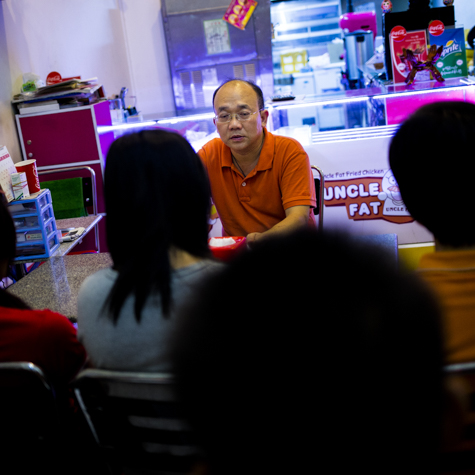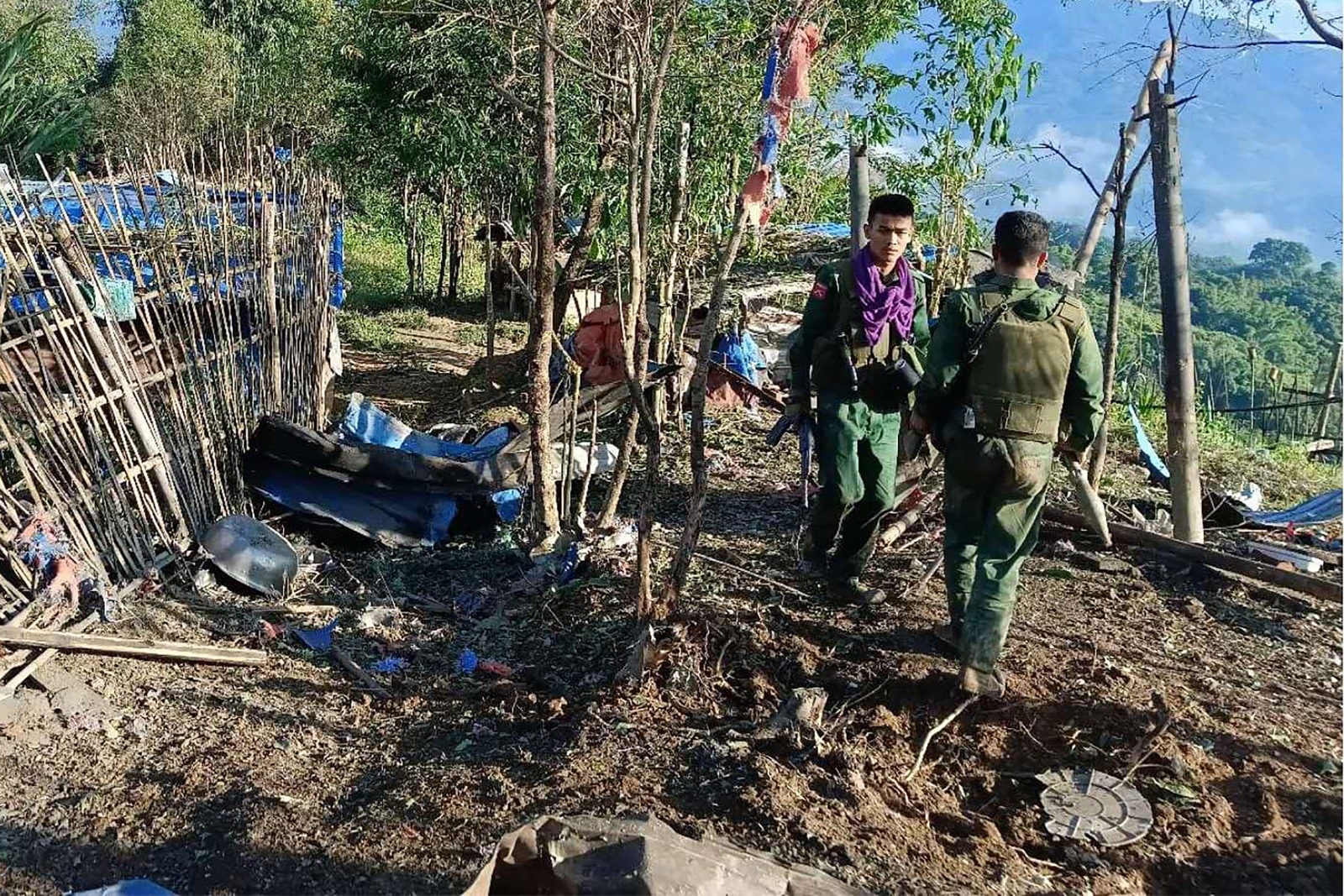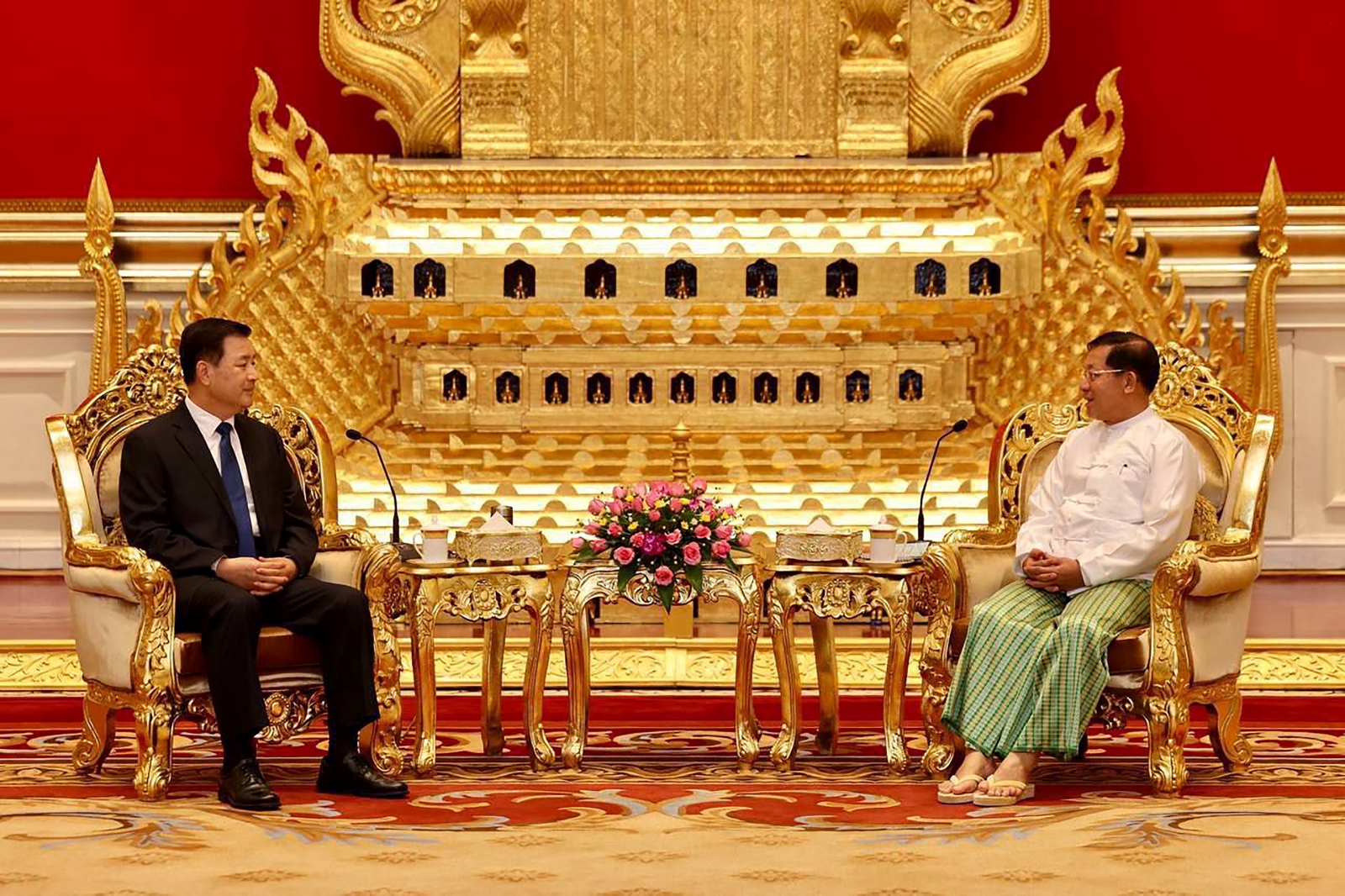A community under pressure sticks to itself and gets on with business.
By ANN WANG | FRONTIER

First generation Chinese immigrants hanging out at the VIP room in Kheng Hock Keong Temple in Yangon’s Chinatown. (Ann Wang / Frontier)
“Don’t go to the Indian area if you’re by yourself,” said a worried Ma Zuriya Momo. “They have a different culture and different religions. It’s not safe for outsiders.” Asked why she put a 969 sticker on her door, Ma Zuriya Momo, 32, a third-generation Burmese Chinese who was educated in Singapore and Britain, said proudly, “because I’m a Buddhist”.
The 969 movement headed by controversial nationalist monk, the Venerable Ashin Wirathu, is aimed at stopping what it regards as a threat to Myanmar from Muslim “expansion”. Stickers, flags and other paraphernalia bearing the 969 symbol are on sale throughout the country. U Wirathu encourages his followers to shop only at businesses displaying the 969 symbol.
Ma Zuriya Momo does not believe the violence towards Muslims in recent times, in Rakhine State and at Meikthila and Mandalay, was caused by the 969 movement. She believes the Buddhist and Muslim communities benefit from having their own symbols, which in the case of the latter is 786.
“The symbols create communities that support each other and if a Muslim is looking for a place to eat, they can feel more comfortable at a restaurant that is already marked with 786 to serve them with the appropriate meal,” she said.
“Do I hate the Muslims? No. But will I do business with them? Absolutely not,” said U Yunming Lee, a second-generation Chinese and the owner of Uncle Fat, a fast food joint in Yangon’s Chinatown adorned with pictures of Buddhist monks.
“It’s a trust issue. Even though we live side by side with each other and are both immigrants to this country, we live our lives apart,” he said. U Yunming Lee left Yangon as a teenager in the 80s to continue his studies in Taiwan. “It was extremely difficult to live as a Chinese in Myanmar under General Ne Win,” he said. “The Chinese schools were closed and we weren’t allowed to speak our mother tongue. In order to finish your studies you had to go to the Burmese public schools, which were not designed to preserve our Chinese culture.”
The nationalisation of property and businesses after Gen Ne Win seized power in a 1962 coup hit the Chinese community hard because of its prominent role in the economy. All shops and land were confiscated by the government, U Yunming Lee said.
Asked if he is anti-Muslim or anti-government, U Yunming Lee laughed. “Who am I to judge?” he said.“To be honest, I just want to lay my head down and mind my own business.” U Yunming Lee said ethnic groups in Myanmar other than the Burmese are marginalized. “The government is having an issue with the Rohingyas now, but that doesn’t mean the Chinese are safe. Who knows, one day the table might turn, and it will be the 1967 anti-Chinese movement all over again.”
Older Sino-Burmese find it difficult to speak about the anti-Chinese violence that erupted in Chinatown in 1967. In one incident, a school in Latha Township was set on fire and students were burnt alive. “It was very scary times,” said U Jingyuan Wang, 83. “Gun shots could be heard down the street, shops were being looted and set on fire. My family went into hiding at a relative’s house which is also located in Chinatown, but it was on the fourth floor.”
U Jingyuan Wang remembers months of living in a crowded apartment, where everyone was squatting next to each other with no space to move. “If you wanted water, you would yell out ‘water, please!’ and people would pass the water to you; it was simply impossible to get up and walk around,” he said.
Chinese have been settling in Myanmar for centuries, mostly because of trade. A big wave of Chinese immigrants entered the country in the 1930s because of the civil war in China between the Communists and Kuomintang.
The Chinese community is estimated to comprise about three percent of Myanmar’s 51.4 million people. The exact number is believed to be much higher and will be included in the final round of census results, expected after the general election, along with figures on the Muslim population and the country’s ethnic composition. Most members of the old, established Sino-Burmese community are the descendants of Cantonese, Hokkien or Hakka speakers from Guangdong or Fujian provinces.
“Who am I to judge? To be honest, I just want to lay my head down and mind my own business.”
Some Myanmar Chinese identify themselves as Bamar to avoid being discriminated against or live their lives without ever applying for citizenship.
U Jinyuan Wang was 13 when he moved to Yangon from southern China. For decades, he refused to be registered as a Burmese citizen. In heavily Hokkien-accented Mandarin, he said he was born a Chinese and wanted to die as a Chinese. “But without being legally registered in Myanmar nor holding an identity card, my children will never be able to apply for medical school, do government jobs, or buy a house. I had no choice but to give in,” U Jinyuan Wang said.
Resentment towards China has risen in recent years, partly because of its financial backing for controversial billion dollar projects, such as the Myitsone Dam — on which work was suspended in 2011 amid an escalating, national protest movement — and the Letpadaung copper mine.
There have also been tensions, especially in Mandalay, over an influx of Chinese from Yunnan Province who have settled in the northern capital and throughout northern Myanmar since the 1990s. U Jinyuan Wang said there was no comparison to the situation during the anti-Chinese riots in Yangon 48 years ago.
“This is nothing; times have changed,” he said. “The bottom line is, does the Myanmar government have the capabilities to build infrastructure for this country themselves?” U Jinyuan Wang welcomed the opening of more Chinese language schools in Myanmar because many people want to learn Mandarin to enhance their job prospects.
The days when Beijing focused on the regime leaders are over as well, said Wang, showing the front page of a newspaper that reported on the recent Aung San Suu Kyi visit to China. Even the opposition party leader is being courted by Beijing nowadays.
Asked why Burmese Chinese were not getting involved in politics to advocate for equal rights for their community and other ethnic minorities, U Jinyuan Wang said the Chinese had opted for a pragmatic approach.
“The government won’t let our children study medicine or law in Myanmar? So what? We worked hard and sent them abroad,” he said. “Now we have grandchildren spread across the globe. They send money back and help relatives get a better life here. And this is how you survive a country like Myanmar.”







